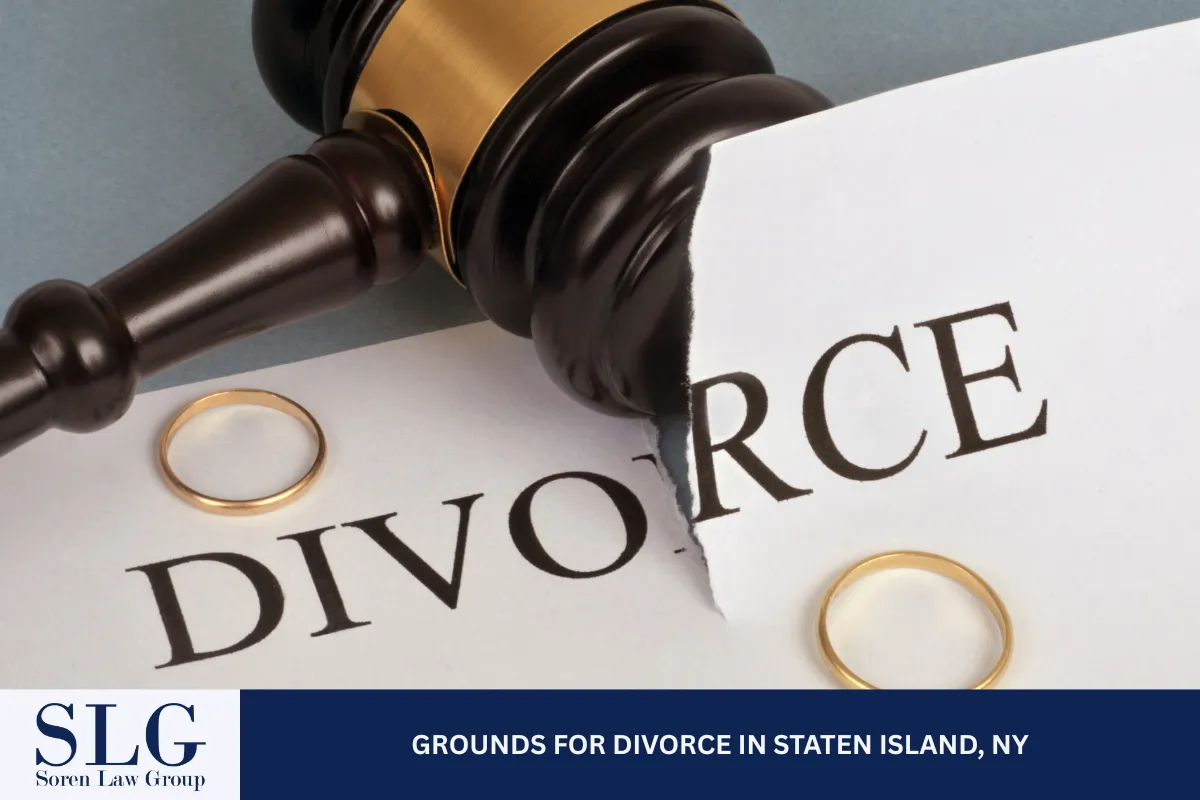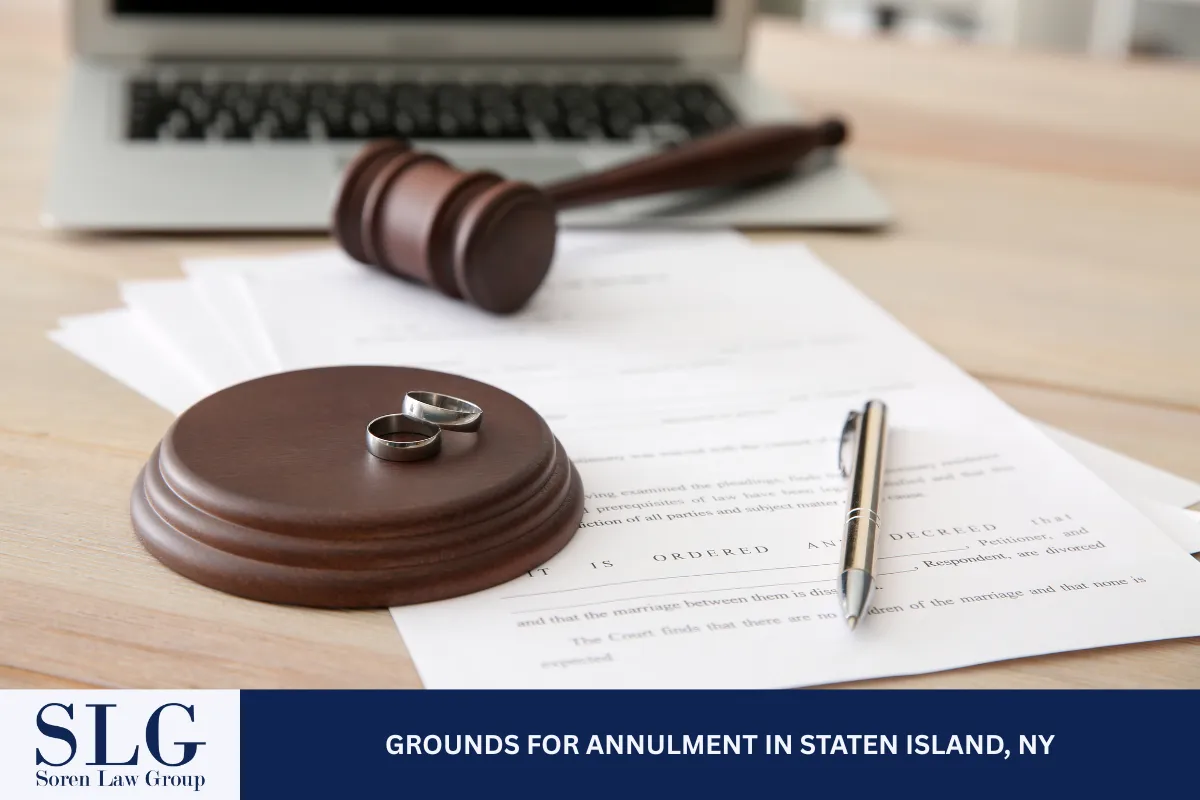Understanding the Difference Between Divorce and Annulment
Choosing between annulment and divorce can be confusing, especially when people don’t fully understand what separates the two. A divorce attorney can guide you through this decision by explaining not just the legal terms but how each option affects your rights, property, and future relationships.
A divorce is the legal process that ends a valid marriage. It officially recognizes that the marriage existed and allows both parties to return to a single status. Divorces are fairly common and are designed to handle the division of property, child custody, and spousal support when a relationship ends. The court focuses on resolving disagreements and ensuring both sides are treated fairly, whether the divorce is contested or uncontested.
On the other hand, annulment works very differently. It declares that the marriage was never legally valid to begin with. Instead of ending a marriage, annulment wipes it out completely, as if it never took place in the eyes of the law. Annulment is not just about saying the marriage was a mistake—it’s about proving that it was never legitimate due to certain legal reasons. The laws governing annulments in New York State are specific, and not every couple qualifies.
Choosing between these two depends on many personal and legal factors. That’s why it’s important to understand the definitions in detail and how they apply to real-world situations in Staten Island.
Grounds for Divorce in Staten Island, NY

In New York, divorce is a well-established legal option for ending a marriage. Over the years, the process has become more straightforward, especially since the introduction of no-fault divorce laws.
A no-fault divorce allows one or both spouses to end the marriage without assigning blame. The most common no-fault ground is that the relationship has been “irretrievably broken” for at least six months. This means the couple can’t fix the issues between them and no longer wish to remain married. The benefit of this option is that it can reduce the emotional strain and legal conflict.
However, couples can still file under fault-based grounds if they prefer to do so. These include:
- Adultery
- Cruel treatment
- Abandonment for a period of one year or more
- Imprisonment of a spouse for three or more years
- Living apart under a legal separation agreement for at least one year
When filing for divorce, issues such as property division, child custody, parenting time, child support, and spousal maintenance must be addressed. A divorce attorney helps make sure all these matters are resolved fairly. They prepare documents, negotiate settlements, and represent you in court if necessary. Their role is to make the legal process easier and protect your interests from start to finish.
Grounds for Annulment in Staten Island, NY

While less common than divorce, annulment is still an option for those whose marriages meet certain conditions. The process is more complex, and not all marriages qualify for annulment under New York law.
To obtain an annulment, one of the following legal grounds must be proven:
- Underage Marriage – If one or both parties were under the legal age of 18 at the time of the marriage and didn’t have parental or judicial consent.
- Mental Incapacity – If one spouse was mentally incapacitated at the time of the marriage and unable to understand what they were entering into.
- Fraud or Misrepresentation – If a spouse lied or concealed important facts that go to the heart of the marriage (e.g., hiding infertility, intent never to live together, or drug addiction).
- Force or Duress – If one spouse was pressured or threatened into the marriage.
- Incurable Mental Illness – If one spouse has had a mental illness for at least five years.
- Bigamy – If one spouse was still legally married to someone else at the time.
These grounds are very specific and require evidence. The court won’t simply take someone’s word; documents, witnesses, and medical or psychological evaluations may be necessary to substantiate claims.
It’s also important to distinguish between a religious annulment and a legal annulment. A religious annulment, granted by a church or religious institution, has no legal effect. It may be important for someone’s faith, but it does not change a person’s marital status in the eyes of the law. The court must grant a civil annulment and carry all the legal consequences.
Because annulments can be more challenging to obtain, it’s helpful to consult with a divorce attorney who understands the laws in Staten Island and the type of evidence required.
Key Differences Between Annulment and Divorce
Although both divorce and annulment lead to the end of a relationship, the paths and legal meanings behind them are very different.
- Legal Status: Divorce ends a valid marriage; annulment declares the marriage was never valid.
- Eligibility: Almost anyone can obtain a divorce; an annulment, however, requires specific legal grounds.
- Proof: Divorce doesn’t require much evidence beyond showing the relationship has ended. Annulment requires proof of conditions like fraud, mental incapacity, or force.
- Financial Matters: In a divorce, property is divided according to equitable distribution rules. In annulment, there may be fewer financial obligations because the marriage wasn’t valid.
- Social or Religious Considerations: Annulment is sometimes chosen due to cultural or religious beliefs that view divorce in a negative light.
Understanding these differences helps individuals determine which legal path is most suitable for their specific circumstances.
When Should You Consider an Annulment Over Divorce?

Choosing annulment over divorce is not just about legal convenience—it often involves deeper personal, emotional, or religious values. In Staten Island, many people consider annulment when certain conditions are met and when their beliefs lead them in that direction.
Some people choose annulment because they feel strongly that the marriage should never have happened. If the relationship began under pretenses—such as lying about finances, identity, or intent to start a family—an annulment might feel like the right choice emotionally and morally.
Others are influenced by religious teachings that discourage divorce. Certain faiths allow annulment but not divorce, so a person might pursue a legal annulment to align with their spiritual beliefs while also protecting their legal rights.
Financial consequences can also play a role. In an annulment, the court may treat both parties as if they were never married, which could limit claims to spousal support or shared assets. This can be helpful or harmful, depending on the circumstances.
However, annulment isn’t always practical. Proving fraud, coercion, or mental incapacity can take time and resources. That’s why understanding your specific case and getting professional advice is so important.
Legal Challenges and Requirements in Annulment Cases
One of the biggest challenges with annulment is proving your case. Courts require strong evidence before declaring a marriage void. Simply feeling regret or saying the marriage was a mistake is not enough.
Documentation such as emails, medical records, marriage certificates, witness statements, or proof of existing marriages (in the case of bigamy) is often required. You may also need to appear in court and testify under oath.
Time limits can also be an issue. Certain annulment grounds—like fraud or duress—must be acted on within a reasonable time after discovering the issue. Delaying action could result in the court rejecting the request.
Moreover, even though annulment voids the marriage, the court still has the authority to decide matters involving children, support, and property. For example, child custody and child support are treated with the same seriousness in an annulment case as in a divorce.
Because these legal processes are complex and the stakes are high, having a skilled divorce attorney is crucial for managing documents, timelines, and negotiations.
Why You Should Speak With a Divorce Attorney in Staten Island

Deciding between annulment and divorce is not something to face alone. The laws in New York are precise and leave little room for error. An experienced divorce attorney understands the details of both processes and can help you make an informed choice based on your unique situation.
During an initial consultation, an attorney will carefully evaluate your case, ask important questions about your marriage, and explain your options clearly. They’ll tell you whether your marriage qualifies for annulment, how strong your case is, or whether divorce might be the more straightforward and legally sound route.
In many cases, people initially think they want an annulment but later discover that divorce is a more practical option. A divorce attorney helps you see the full picture—legal obligations, rights, risks, and possible outcomes—so you can proceed with clarity and confidence.
Working with a legal professional also ensures you won’t miss deadlines or overlook requirements. They’ll help you prepare the necessary paperwork, gather evidence, and present your case effectively in court.
Choosing the Right Path in Staten Island
Understanding the full scope of divorce and annulment laws in Staten Island is the first step in protecting your future. These legal processes are not one-size-fits-all, and your choice can have lasting effects on your finances, reputation, and overall well-being.
Whether your marriage was brief or long-term, legally valid or questionable from the outset, understanding the distinction between divorce and annulment is crucial. Taking action early, with the help of a legal expert, ensures your rights are preserved and your voice is heard.
No one plans for a marriage to end, but having the right knowledge—and the right legal support—makes it easier to take the next step.
Staten Island Divorce Attorney – Soren Law Group

Soren Law Group assists individuals and families in Staten Island who are facing challenging decisions regarding divorce or annulment. Our team understands that ending a marriage isn’t easy, and we’re here to guide you through each step with clarity and care. Whether you’re dealing with issues of fraud, separation, or legal grounds for ending your marriage, we take the time to understand your situation and clearly explain your options.
We focus on all areas of family law, including divorce, child custody, support matters, pre-nuptial agreements, and more. Every case is unique, and we’re committed to providing solutions tailored to your needs. If you’re unsure about the next step or need trusted legal advice, call us today at (718) 815-4500 to schedule a consultation.
Frequently Asked Questions About Divorce and Annulment in Staten Island, NY
1. What is the main difference between a divorce and an annulment in New York?
In New York, the key difference is that a divorce ends a valid marriage. At the same time, an annulment declares that the marriage was never legally valid to begin with. A divorce recognizes the legal union but ends it due to breakdowns in the relationship, like irreconcilable differences, abandonment, or cruelty. An annulment, however, requires that specific legal grounds existed at the time of marriage—such as fraud, force, bigamy, or mental incapacity.
Annulments are generally harder to obtain because they involve proving that something made the marriage invalid from the start. If a judge grants an annulment, it’s as if the marriage never happened under the law. That said, both divorce and annulment may still address similar matters, including property division and child custody. Because the legal consequences vary, it’s essential to consult a knowledgeable divorce attorney before filing for either.
2. What are the legal grounds for annulment in New York State?
Annulment is available in New York, but only under very specific circumstances. There are five main legal grounds for annulment under New York law:
- One or both parties were under age 18 at the time of marriage without proper parental or court approval.
- Mental incapacity prevented one party from understanding the nature of the marriage.
- Consent was obtained by fraud, misrepresentation, or coercion.
- One party is physically unable to consummate the marriage, and the condition is incurable.
- One spouse was legally married to someone else at the time (bigamy).
You must provide evidence for these claims in court. Also, certain time limits may apply, especially for fraud or underage marriages. A judge will not approve an annulment without clear and convincing proof that the marriage violated one of these conditions. Always speak with a licensed divorce attorney to determine whether your situation meets the legal standards.
3. Can you get an annulment for religious reasons in New York?
While religious annulments are recognized within specific faith communities, they do not have any legal effect in New York. Only a civil annulment, granted by a court, will legally end your marriage and change your marital status under the law.
For example, the Catholic Church may issue a religious annulment that allows someone to remarry within the church. However, that doesn’t change the fact that you’re still legally married in the eyes of the state. If you want your marriage legally annulled, you’ll need to file in civil court and meet the specific requirements under New York law.
It’s not uncommon for people to pursue both a religious annulment for spiritual reasons and a civil one for legal purposes. To fully protect your legal rights and avoid issues with remarriage, finances, or child custody, it’s crucial to handle the civil process properly with the help of a qualified attorney.
4. What happens to property and children during an annulment?
Even if a marriage is annulled, the court still has the authority to address child custody, child support, and property issues—especially when children or shared finances are involved. New York courts aim to ensure fairness and the best interests of the children, regardless of the marriage’s validity.
When it comes to property, New York follows the rule of equitable distribution, which means assets acquired during the marriage are divided fairly—but not always equally. In an annulment, however, the court may treat the marriage as if it never existed, so property might be returned to the original owner if it was held separately.
For children, the court will treat them as legitimate and establish custody and support just as it would in a divorce. The child’s welfare is always the top priority. Suppose you’re seeking an annulment and have children or shared assets. In that case, it’s strongly advised to work with an experienced family law attorney.
5. How long does it take to get a divorce or annulment in Staten Island, NY?
The time it takes depends on the complexity of your case. A simple, uncontested divorce in Staten Island can be finalized in as little as 3 to 6 months if both parties agree on all issues, such as custody, property division, and support. Contested divorces, where the couple disagrees on major terms, can take a year or more, especially if the case goes to trial.
Annulments, on the other hand, may take longer if the required evidence isn’t immediately available. Since the burden of proof lies with the person requesting the annulment, gathering documents, witness statements, or expert opinions can extend the timeline.
Factors that affect timing include:
- Whether both parties agree
- Court availability
- Amount of documentation required
- Whether children or property are involved
For both divorce and annulment, delays can be avoided by hiring a knowledgeable divorce attorney who understands how the Staten Island court system works and can help move your case forward efficiently.
Read more: Is Annulment Right for You? Divorce Attorney Consultation in Staten Island, New York











